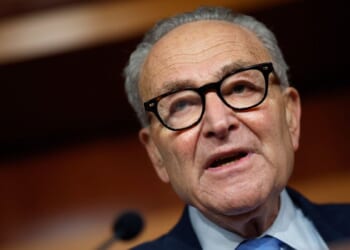WASHINGTON (AP) — The U.S. trade deficit fell by nearly 24 percent in August as President Donald Trump’s sweeping global tariffs pushed imports lower.
In a report delayed for more than seven weeks by the federal government shutdown, the Commerce Department said Wednesday that the the gap between what the United States buys from other countries and what it sells them fell to $59.6 billion in August, from $78.2 billion in July.
Imports of goods and services dropped 5 percent to $340.4 billion in August from July, when U.S. companies were stocking up on foreign products before Trump finalized taxes on products from almost every country on earth. Those levies went into effect Aug. 7.
U.S. exports blipped up 0.1 percent in August to $280.8 billion.
Trump, charging that America’s persistent trade deficits mean that other countries have taken advantage of the U.S., has overturned decades of U.S. policy in favor of free trade, slapping double-digit tariffs on imports from most countries and targeting specific products, including steel, copper, and autos, with their own levies.
Still, the U.S. trade deficit is up so far in 2025, coming in at $713.6 billion through August, up 25 percent from $571.1 billion in January through August 2024.
A drop in imports and the trade deficit is good for economic growth because foreign products are subtracted from the nation’s gross domestic product. GDP is economic output in terms of a nation’s goods and services.
“August’s smaller trade deficit will be a tailwind for third quarter real GDP, since it means that more U.S. expenditures were directed toward domestically-produced goods and services rather than foreign ones,” Bill Adams, chief economist at Comerica Bank, wrote in a commentary. “While this release is quite dated because of the government shutdown, it contributes to evidence that the economy was growing briskly in the third quarter.”
Tariffs, which Trump says will protect U.S. industries and lure factories to America, are paid by importers who typically attempt to pass along the higher cost to their customers. Economists say Trump’s tariffs are one reason U.S. inflation remains above the Federal Reserve’s 2 percent target.
Do you approve of how Trump has handled the economy?
After voters’ dissatisfaction with the high cost of living led to big Democratic gains in the Nov. 4 elections, the president relented and dropped tariffs last week on beef, coffee, tea, fruit juice, cocoa, spices, bananas, oranges, tomatoes, and certain fertilizers, saying they “may, in some cases” have contributed to higher prices.
His tariffs are also facing a legal challenge that has gone to the Supreme Court. In a Nov. 5 hearing, the justices sounded skeptical that the president had the authority to bypass Congress and slap unlimited tariffs on most imports simply by declaring a national emergency.
____
AP Writer Josh Boak contributed to this report.
The Western Journal has not reviewed this Associated Press story prior to publication. Therefore, it may contain editorial bias or may in some other way not meet our normal editorial standards. It is provided to our readers as a service from The Western Journal.
Advertise with The Western Journal and reach millions of highly engaged readers, while supporting our work. Advertise Today.


















